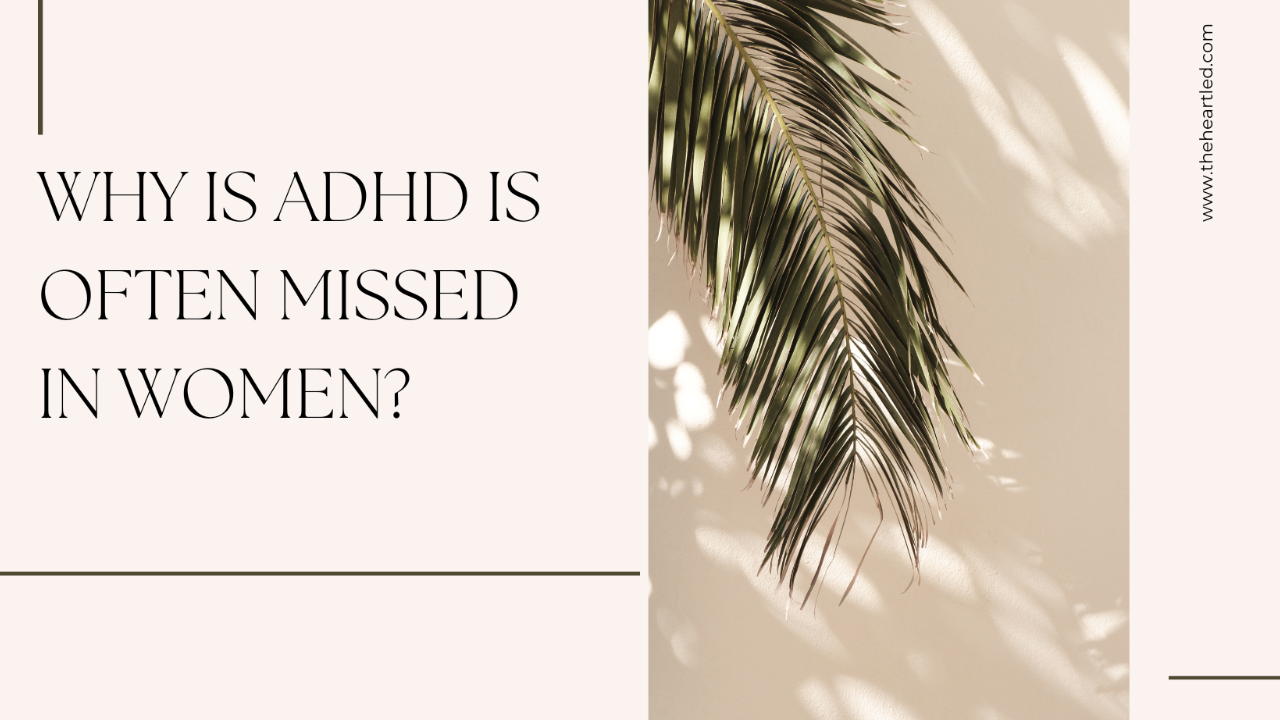Why Are ADHD Symptoms in Women SO Often Missed?
Mar 08, 2023
Disclaimer: Life is messy and weird at times, so a lack of focus, anxious times or not being on the ball 24/7 doesn't necessarily correlate to the diagnosis of a medical condition - we don't need to fall into the trap of overpathologising every detail or behaviour. However, a great rule of thumb is that if your suspected ADHD symptoms are strong enough to the point of disrupting your life, then please seek professional support.
Living with undiagnosed ADHD feels like an invisible maze. You can just tell something's "in your way", you just can't name it or move past it. It wasn't til my late 20's when I just knew something wasn't clicking that I began to investigate further.
My story isn't unusual, and as adult diagnosis for women becomes increasingly common, it begs the question of and compassion for those who never receive one at all.
In young girls, ADHD is often missed as we tend to present symptoms that are not as obvious as those seen in boys. While boys with ADHD may be hyperactive and disruptive in class, girls with ADHD may be more withdrawn, quiet, and daydreamy.
Girls with ADHD may also struggle with organisation, time management, and forgetfulness, which can be mistaken for laziness or lack of motivation, especially given societal expectations for girls and women to excel in these areas. You can check out 8 hidden symptoms of ADHD in women here.
ADHD was historically pigeonholed as a disorder that affects hyperactive young white boys, but in truth, it affects people of all genders, races and ages. Many men who present symptoms differently to historical ADHD stereotypes or whose symptoms are dismissed as characteristic of racial stereotypes or cultural expectations also often receive later life diagnosis.
Historically, the early template of ADHD was modelled on young white boys as they were the subjects of primary research - which was a common trend in healthcare (to centre white males). This means that many of the subtle differences of how ADHD presents depending on race, ethnicity and gender have been largely overlooked, leading to a lack of appropriate care and diagnosis.
In addition to these gender-specific symptoms, many people with ADHD also have co-occurring conditions such as anxiety or depression, which can further complicate diagnosis. For women, hormonal changes associated with menstruation, pregnancy, and menopause can exacerbate symptoms of ADHD, making it harder to recognise and manage.
Dismissing ADHD symptoms as "mood swings" or "that time of the month" may mean no one takes a serious look at what's actually going on underneath.
ADHD in women is often missed because of historical, medical and social failings. Many of the symptoms of ADHD in women have been woven into the narrative and blamed as personal failings. The lack of awareness of how symptoms differ between demographics was a direct result of it - quite simply - not really being thought of, because in early medicine, the white male was considered a representative of "the people".
The hangover of this can be seen across our society. It's not a revelation nor an attack on white men today - plenty of white men will also suffer under this historical idealism too. It's a reflection of what happens when we don't take up space or fight for equality. Having honest conversations about this can create the much needed ongoing change we're beginning to see.
The impact of going undiagnosed with ADHD can be profound. Without proper diagnosis and treatment, people with ADHD can struggle with academic or professional achievement, relationships, and overall quality of life. They may also experience low self-esteem, anxiety, and depression as a result of feeling like they are constantly falling short of expectations - it's estimated that by age 12, those with ADHD will receive 20,000 corrective or negative than their friends, siblings and peers without.
It's no wonder, then, that as awareness grows, many people begin exploring the possibility they have ADHD and seeking diagnosis. As more knowledge is shared about the different ways it can present and the impact it can have, more people are recognising themselves in the symptoms and seeking help. Additionally, advancements in research and treatment options have made it easier for people to get the help they need.
Newer research is continuously updating meaning that a much broader idea of ADHD is welcomed. In the coming decades, this will continue to improve and more people will receive the support they desperately need. However, in this same time, many of those will continue to be missed. It's truly heartbreaking to consider the number of people stuck in their own invisible maze with no idea of why they struggle.
If you suspect that you or someone you know may have ADHD, it is important to seek help from a qualified healthcare professional who can provide an accurate diagnosis and develop a treatment plan tailored to your individual needs.
ADHD is different for everyone who experiences it, but there are some common threads we can share and encourage one another with on our journeys. It's my mission to remind myself and others that with proper support, people with ADHD can thrive and live fulfilling lives.
Stay gorgeous,
Dannielle
Want more regular-ish goodness?
Sign up for more ADHD, anxiety & relationship emails plus be the first to hear of offers and more!
We hate SPAM. We will never sell your information, for any reason.

